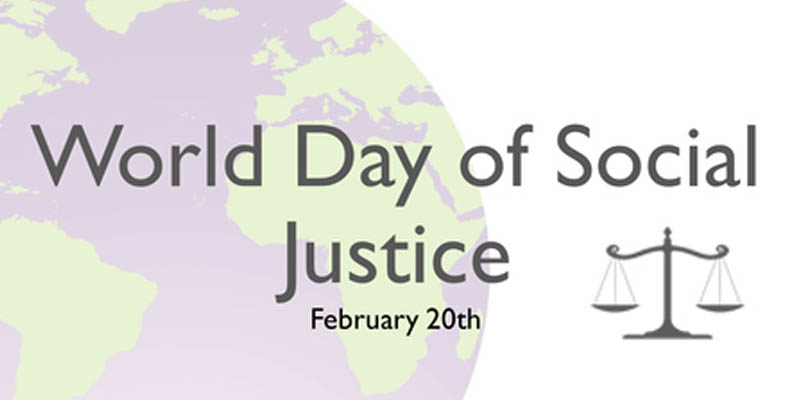- World
- Feb 20
Explainer / World Day of Social Justice
The United Nations observes World Day of Social Justice on February 20. It was declared by the UN General Assembly on November 26, 2007.
The UNGA recognises that social development and social justice are indispensable for the achievement and maintenance of peace and security within and among nations and that, in turn, social development and social justice cannot be attained in the absence of peace and security, or in the absence of respect for all human rights and fundamental freedoms.
Significance of social justice
Social justice marks the difference between patronizing charity and a firm rights-based approach to development and human wellbeing. Effective social justice transforms altruistic gestures into justiciable rights, particularly for the benefit of the most vulnerable people.
The quest for social justice is as old as humanity itself. It has been part of philosophical reflection and political discourse for centuries and it has deserved the attention of some of the greatest minds of diverse cultures. Visions of social justice have generally guided social transformation, resulting sometimes in brilliant outcomes such as the universal recognition of human rights, which is today’s accepted principle for building a better world.
Social justice is a term profusely utilised in academic, political and ordinary discourse although it is not commonly defined with clarity. Nevertheless, the severity and extension of current social ills, including but not limited to massive global poverty, wide-spread social inequality, and untenable environmental degradation, clearly indicates the lack of fairness and the extended violation of rights attempted against recognised underpinnings of justice. Many contemporary societies are usually perceived as unjust societies for a good reason: what people regard as their legitimate entitlements, including the right to life, the most fundamental of all rights, are infringed on a daily basis.
Technological advances, globalisation and economic growth cannot be identified with progress if they fail to reach the most vulnerable, which in many countries constitute absolute majorities, especially women.
The theme for 2021
This year, the theme is “A Call for Social Justice in the Digital Economy”.
The digital economy is transforming the world of work. Over the past decade, expansion in broadband connectivity, cloud computing, and data have led to the proliferation of digital platforms, which have penetrated several sectors of the economy and societies.
Since early 2020, the consequences of the COVID-19 pandemic have led to remote working arrangements and allowed for the continuation of many business activities, further reinforcing the growth and impact of the digital economy.
The crisis has also laid bare and exacerbated the growing digital divide within, between and across developed and developing countries, particularly in terms of the availability, affordability and use of information ICTs and access to the internet, deepening existing inequalities.
While digital labour platforms provide workers with income-generating opportunities and benefits from flexible work arrangements, including for women, persons with disabilities, young people, and migrant workers, they also present some challenges.
For workers, these relate to the regularity of work and income, their rights to fair working conditions, social protection and adequate standard of living, skills utilisation, and the right to form or join trade unions. Algorithmic monitoring practices, in some cases augmenting to workplace surveillance, are also a growing concern.
Consequences of the COVID-19 pandemic are exposing the risks and inequalities of workers engaged in location-based platforms. For traditional businesses, the challenges include unfair competition from platforms, some of which are not subject to conventional taxation and other obligations because of their novel nature, including with respect to their workforce.
Another challenge for traditional businesses is the amount of funding required to continuously adapt to digital transformations, especially for small and medium enterprises, and inadequate availability of reliable digital infrastructure, in the global South.
The regulatory responses from many countries have started to address some of the issues related to working conditions on digital labour platforms.
However, there is a need for international policy dialogue and coordination since digital labour platforms operate across multiple jurisdictions. The promotion of national, regional, and international multi-stakeholder policy dialogue and coordination is also vital to ensure regulatory certainty and the applicability of universal labour standards, given the diversity of responses by countries and platform companies.
Transformations, especially for small and medium enterprises, and inadequate availability of reliable digital infrastructure, in particular in the global South.
The regulatory responses from many countries have started to address some of the issues related to working conditions on digital labour platforms. However, there is a need for international policy dialogue and coordination since digital labour platforms operate across multiple jurisdictions.
The promotion of national, regional, and international multi-stakeholder policy dialogue and coordination is also vital to ensure regulatory certainty and the applicability of universal labour standards, given the diversity of responses by countries and platform companies.
This year's commemoration supports efforts by the international community to search for solutions to achieve sustainable development, poverty eradication, the promotion of full employment and decent work, universal social protection, gender equality and access to social well-being and justice for all.
Consequently, it aims at fostering dialogue with member states and relevant UN institutions and other stakeholders on actions needed to overcome the digital divide, provide decent work opportunities, and protect labour and human rights in the modern era of digital technologies.
Manorama Yearbook app is now available on Google Play Store and iOS App Store

